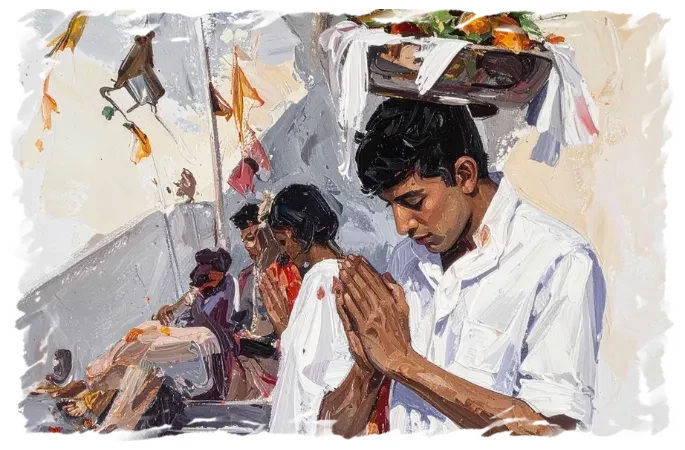‘Aaadara nadiya gala awa degoda thala. Pema soyala.’
Padmasiri almost dropped his phone trying to put it on silent mode.
‘Piri diya kadithi pawa awa tharanga papa. Pema soyala.’
The phone screamed like a toddler who refuses to calm down.
Padmasiri shook the phone several times.
“I’m coming,” Pasan said, dashing into the living room.
Pasan gave back the phone to his father. “Have you called Irfan?” he asked.
Padmasiri lowered his voice. “Gamini is already on his way.”
“Why Gamini? He charges a lot and spits out of the three-wheeler. Why did you ask him to come? You should have asked Irfan.”
Padmasiri raised his voice. “We are not going to gallivant around with thambis. They killed people in churches on Easter. Rich thambi businessmen fund terrorists. They don’t care about people.”
“Amme, do you know about this?” Pasan asked after a pause.
“I’m washing fruits with turmeric water for the puja wattiya,” Ranjani replied from the kitchen.
“The ringtone of your phone is a song sung by Mohideen Baig. Isn’t he also a thambiya?”
Pasan wished he could yell at his father. He didn’t want to pick a fight with him just minutes before going to the devale.
Padmasiri shook his leg as he scrolled through Facebook. Pasan’s glaring eyes were fixed on the lines stretching across Padmasiri’s forehead.
A few minutes later, a three-wheeler honked outside.
A reddish-brown, long-tailed rilawa perched on a nearby na tree welcomed Padmasiri, Ranjani, and Pasan with a loud shriek to the devale.
“Puthe, you should prepare the puja wattiya yourself because your vow has been fulfilled.” Padmasiri held Pasan’s hand. “I’m going to miss him when he’s gone.” He dabbed at his eyes as Pasan and Ranjani hurried away to the place where offerings are prepared.
Nearly half an hour later, Pasan carried the puja wattiya on his head, a divine feast of seven fruits on a turmeric-sprinkled basin covered with a spotless white piece of cloth. Ranjani had beseeched the god Gale Bandara at the devale more times than she could count, and he had finally heard her prayers.
They were welcomed to the devale with a strong smell of sambrani and camphor, which made Pasan nearly cough on someone. Ranjani nudged Pasan to recite, chanting along with the kapu mahattaya.
“Young people these days have no idea about our Buddhist rituals and traditions. But young Muslims are very pious. Mallawapitiya mosque is full of youths on Friday,” Padmasiri muttered to himself.
Later, the kapu mahattaya accepted their offering. Pasan squinted to reach the three bells enveloped in the darkness. Ranjani’s eyes twinkled as they rang. Gale Bandara Devi Hamuduruwo had accepted their humble act of gratitude. She looked at Padmasiri, who was praying with his eyes closed.
Pasan and Ranjani handed out the returned halves of divine fruits among other devotees, as instructed by the kapu mahattaya.
Padmasiri settled on one of the many steps leading to the devale. The smell of the bright yellow pineapples had already watered his mouth.
The loud dashing of a coconut brought him back. Padmasiri heard someone saying the monsoon would fall soon. Suddenly, he thought of getting a pirith noola for Pasan, for his protection.
While rushing inside the devale faster than a man running to catch a train, he passed by a nearby signboard: Gale Bandara Devalaya is a sacred site located at the foot of the Ethugala rock, right beside the Ethkanda Raja Maha Viharaya in Kurunegala. Prince Wathhimi Bandara (literally meaning the prince destined to acquire wealth) is a son of King Buvenekabahu I and his Muslim consort. In 1284, Prince Wathhimi Bandara ascended the throne at a young age, after his father leapt to his death upon returning from battle, having realised that his queen and harem had leapt to their own deaths earlier due to a drunken messenger’s miscommunication. Brought up in a Muslim environment, the young king was seen as partial to the Muslims by the Sinhalese council and aristocracy. During his reign, a rumour was spread that a golden pot was floating in the Kurunegala Lake. Leveraging the king’s desire to acquire the treasure, the Buddhist clergy and the courtiers plotted to kill the king at a pirith chanting ceremony. At midnight, the king was pushed off the Ethugala rock where the ceremony was taking place. The legend goes on to say that the king was reborn as a demon and subsequently turned into a deity known as Gale Bandara by god Kataragama to help people in distress. There are two other Muslim shrines in Kurunegala dedicated to Gale Bandara and his mother.
“All these thambis are terrorists. They killed people praying at churches on Easter. Gnanasara Hamuduruwo warned about them. But he’s in jail now. Check out this Facebook post.” Padmasiri put his phone over Ranjani’s Divaina newspaper headline: Dr. Safi from Kurunegala further remanded, amid accusations of sterilising Sinhalese women.
“What does Facebook say now?” Ranjani held the phone.
“The camels and tigers in this country should live by the lion’s rules,” Padmasiri roared.
“What Facebook post?” Ranjani gave the phone back to Padmasiri and went back to her newspaper.
“Pasan, come here. What happened to my Facebook post? How do I get it back?” Padmasiri shouted. When it came to his phone, Padmasiri needed everything to be instant.
Striding into the living room, Pasan took his father’s phone.
“Here,” he said, handing it back to him.
“I have to prepare lunch,” Ranjani said, getting up from her chair.
“Wait…. see this post for yourself.” Padmasiri touched her elbow. “This doctor Shafi is a rich businessman. Not an ordinary doctor. He will bribe the police to get away. They think they can do anything because they are rich. Poor people suffer in the end.”
Ranjani stared at the phone. “Who are these women who say they have been sterilised? Is there evidence? I heard on radio news that it’s all made up.”
Padmasiri squashed a mosquito on his shoulder. “You think these women are making up stories? Shame on you for not trusting Sinhalese women.”
Pasan looked his father straight in the eye. “I shouldn’t go to Dubai either because my future boss will be a thambiya, no?”
“Are you trying to teach me now?” Padmasiri rose from his chair.
“Both of you, stop it. Pasan, go back to your room,” Ranjani snapped.
Pasan was lying on his bed, steaming. He remembered the occasion his father beat him with a stick for going around the village on the bicycle with his friend, Rizvi. They had grown up side by side, from childhood, like two mangoes sprouting from the same stem.
“Stop beating the child. He knows nothing of what happened. They have been friends for a long time.” Ranjani’s wails bounced around his room.
“We’re all the same. Rizvi is no different than you or me,” she said, dressing his wounds. “Your father is not a bad person. He went through a lot recently.”
After all these years, Pasan still remembered how the soft, dark brown watalappan shared by Rizvi’s mother melted in his mouth, tastier than Kandos chocolate.
““But I don’t understand it. Thaththa hit me that day, but he was the one who taught both of us to ride the bicycle.”
Pasan pulled the bed sheet over his head.
“Has anyone in your family been convicted in a court?” Pasan considered the question. He was reading the application form the job agency had given him. Once he filled it, the agency would forward it to his employer in Dubai.
“What? Convicted? No? Why would they ask such questions?” Padmasiri gasped.
“What do you mean?” Pasan laughed.
Padmasiri glanced at Ranjani across the table. “I was in jail some time back,” he stammered, avoiding Pasan’s eyes.
Padmasiri told Pasan how he was imprisoned when Pasan was barely seven years old. Padmasiri used to work at a rich Muslim businessman’s shop as a cashier who was his most trusted worker. The other Muslim workers who were jealous of him had framed him with a false accusation of fraud. He was imprisoned for three months but the true facts had come out in the end.
“That Muslim mudalali was shocked. He even came to our house to apologise. He tried giving us money but I chased him away. The people in the village had already spread rumours about me. That’s why we left our village. You had to leave your mango friend Rizvi.”
Ranjani looked away to wipe her tears.
“Do you think…. the job offer will be….turned down?” Pasan stammered.
“We’ll go to the devale next Wednesday,” Padmasiri said after a pause.
“Gale Bandara Devi Hamuduruwo will protect us,” Pasan started to pray in his mind. He told himself that a fresh mango from his garden would be placed before god Gale Bandara as an offering, when his vow is fulfiled.



